Project Management Methodologies: A Comparison of PMBOK and PRINCE2
VerifiedAdded on 2021/04/21
|9
|1514
|63
Report
AI Summary
This report provides a detailed overview of project management methodologies, defining them and evaluating their importance. It explores the role of project management methodologies in project success, emphasizing the selection process, with PRINCE2 as a case study. The report then compares and contrasts the PMBOK and PRINCE2 methodologies, highlighting their differences in approach and application. Furthermore, it evaluates the role of PRINCE2 within the project lifecycle, particularly in ICT projects. The report concludes by summarizing the key benefits and considerations for each methodology, supported by relevant references. The analysis covers aspects like risk management, resource allocation, and project planning to provide a comprehensive understanding for effective project execution.
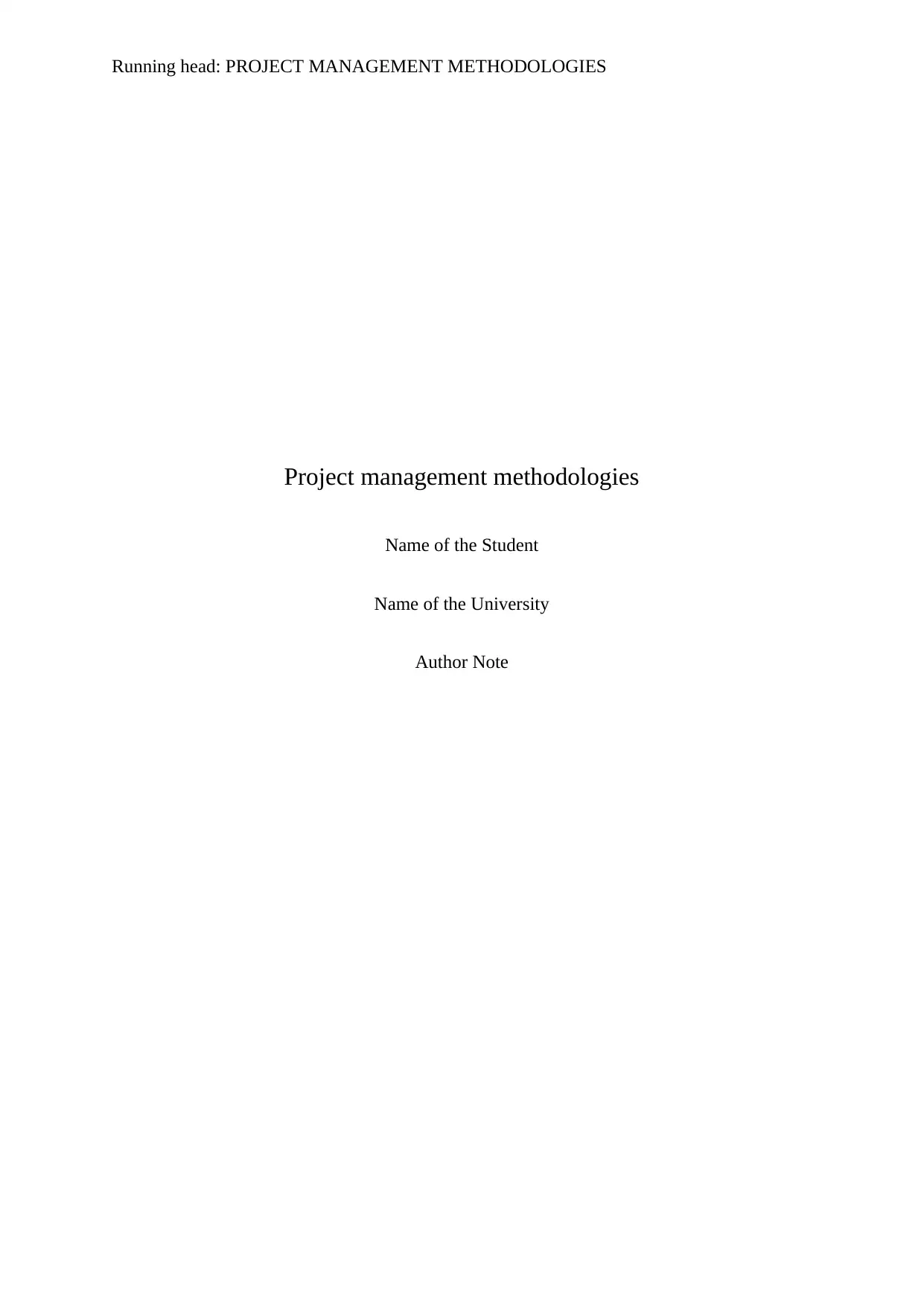
Running head: PROJECT MANAGEMENT METHODOLOGIES
Project management methodologies
Name of the Student
Name of the University
Author Note
Project management methodologies
Name of the Student
Name of the University
Author Note
Paraphrase This Document
Need a fresh take? Get an instant paraphrase of this document with our AI Paraphraser
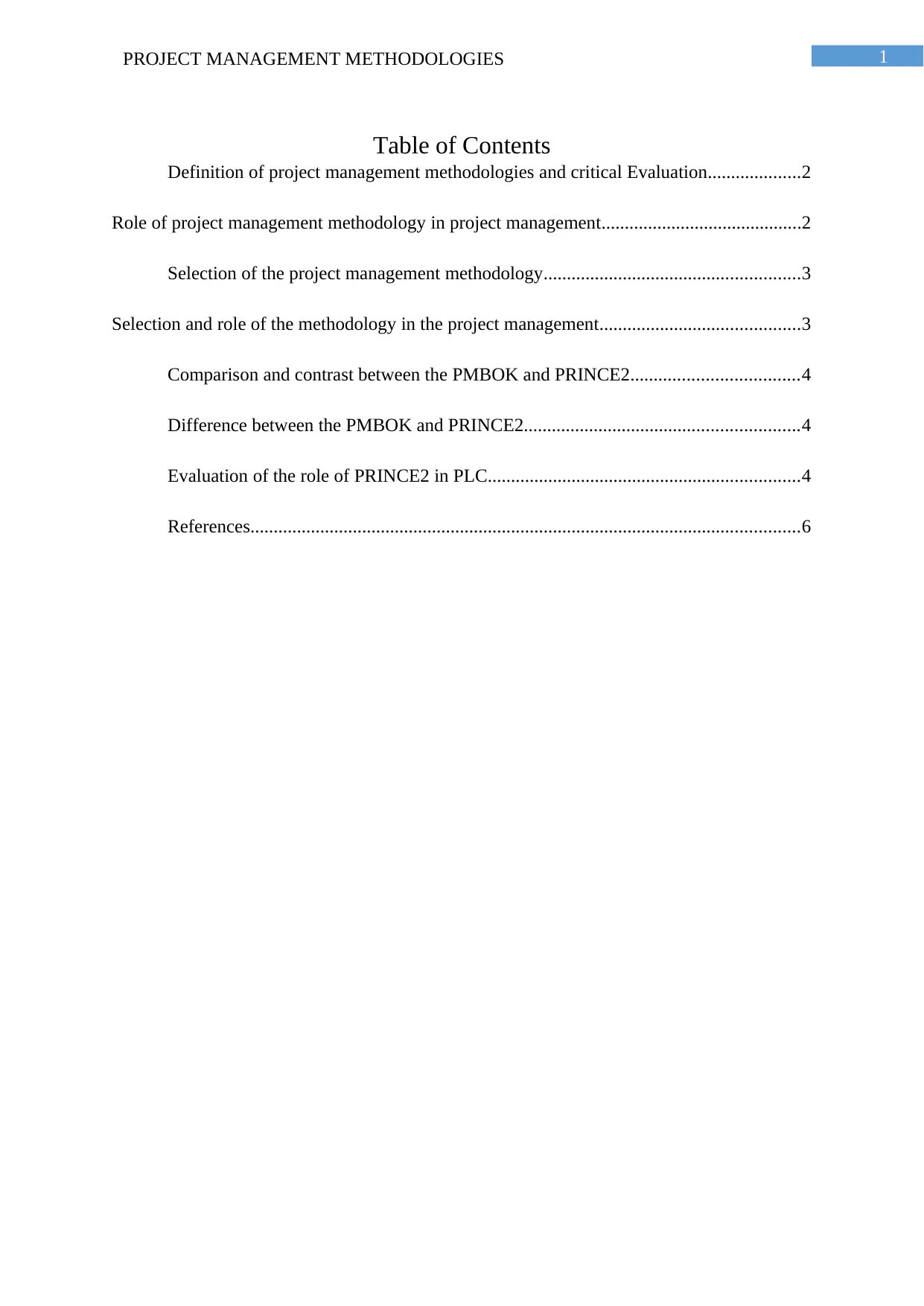
1PROJECT MANAGEMENT METHODOLOGIES
Table of Contents
Definition of project management methodologies and critical Evaluation....................2
Role of project management methodology in project management...........................................2
Selection of the project management methodology.......................................................3
Selection and role of the methodology in the project management...........................................3
Comparison and contrast between the PMBOK and PRINCE2....................................4
Difference between the PMBOK and PRINCE2...........................................................4
Evaluation of the role of PRINCE2 in PLC...................................................................4
References......................................................................................................................6
Table of Contents
Definition of project management methodologies and critical Evaluation....................2
Role of project management methodology in project management...........................................2
Selection of the project management methodology.......................................................3
Selection and role of the methodology in the project management...........................................3
Comparison and contrast between the PMBOK and PRINCE2....................................4
Difference between the PMBOK and PRINCE2...........................................................4
Evaluation of the role of PRINCE2 in PLC...................................................................4
References......................................................................................................................6
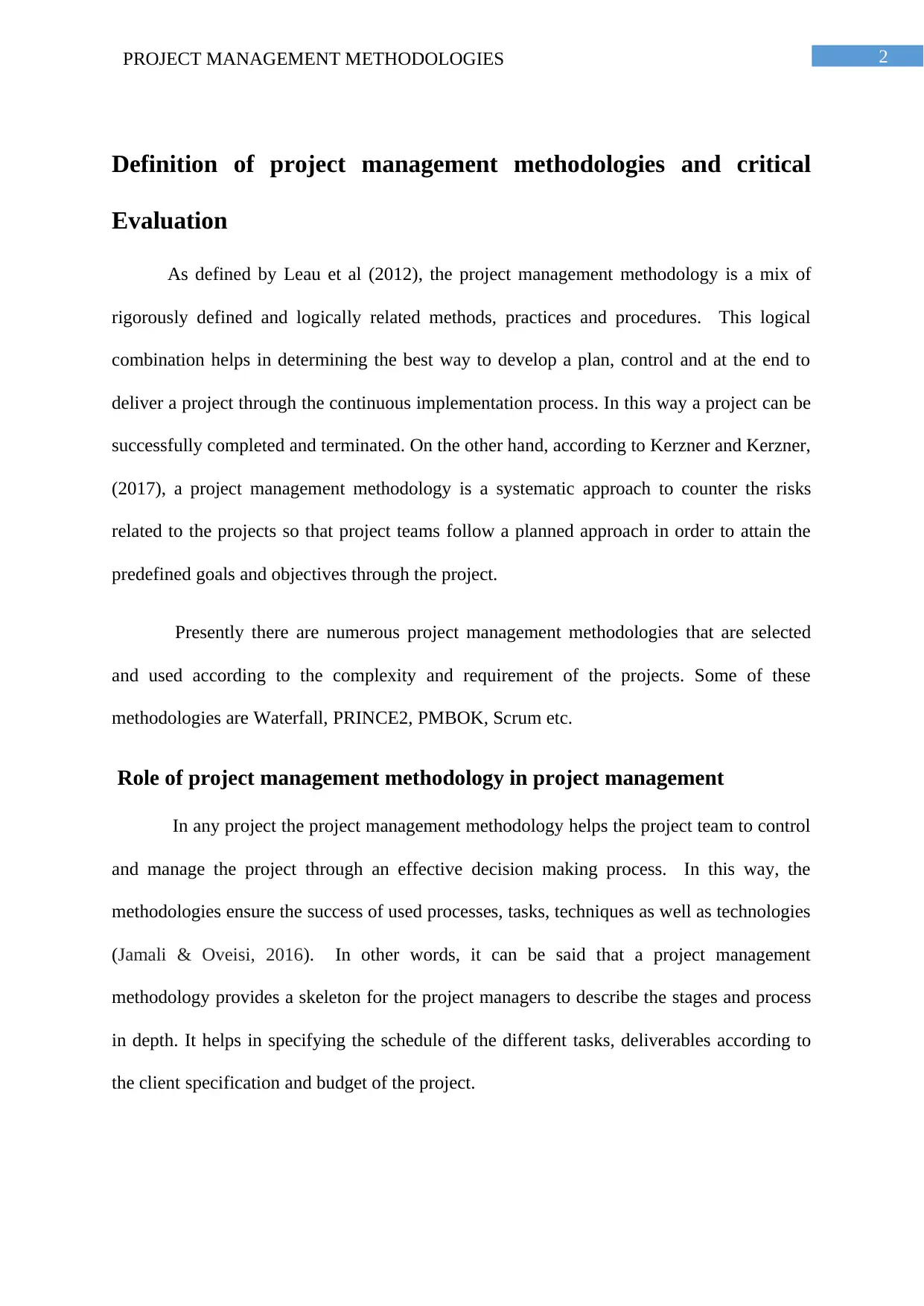
2PROJECT MANAGEMENT METHODOLOGIES
Definition of project management methodologies and critical
Evaluation
As defined by Leau et al (2012), the project management methodology is a mix of
rigorously defined and logically related methods, practices and procedures. This logical
combination helps in determining the best way to develop a plan, control and at the end to
deliver a project through the continuous implementation process. In this way a project can be
successfully completed and terminated. On the other hand, according to Kerzner and Kerzner,
(2017), a project management methodology is a systematic approach to counter the risks
related to the projects so that project teams follow a planned approach in order to attain the
predefined goals and objectives through the project.
Presently there are numerous project management methodologies that are selected
and used according to the complexity and requirement of the projects. Some of these
methodologies are Waterfall, PRINCE2, PMBOK, Scrum etc.
Role of project management methodology in project management
In any project the project management methodology helps the project team to control
and manage the project through an effective decision making process. In this way, the
methodologies ensure the success of used processes, tasks, techniques as well as technologies
(Jamali & Oveisi, 2016). In other words, it can be said that a project management
methodology provides a skeleton for the project managers to describe the stages and process
in depth. It helps in specifying the schedule of the different tasks, deliverables according to
the client specification and budget of the project.
Definition of project management methodologies and critical
Evaluation
As defined by Leau et al (2012), the project management methodology is a mix of
rigorously defined and logically related methods, practices and procedures. This logical
combination helps in determining the best way to develop a plan, control and at the end to
deliver a project through the continuous implementation process. In this way a project can be
successfully completed and terminated. On the other hand, according to Kerzner and Kerzner,
(2017), a project management methodology is a systematic approach to counter the risks
related to the projects so that project teams follow a planned approach in order to attain the
predefined goals and objectives through the project.
Presently there are numerous project management methodologies that are selected
and used according to the complexity and requirement of the projects. Some of these
methodologies are Waterfall, PRINCE2, PMBOK, Scrum etc.
Role of project management methodology in project management
In any project the project management methodology helps the project team to control
and manage the project through an effective decision making process. In this way, the
methodologies ensure the success of used processes, tasks, techniques as well as technologies
(Jamali & Oveisi, 2016). In other words, it can be said that a project management
methodology provides a skeleton for the project managers to describe the stages and process
in depth. It helps in specifying the schedule of the different tasks, deliverables according to
the client specification and budget of the project.
⊘ This is a preview!⊘
Do you want full access?
Subscribe today to unlock all pages.

Trusted by 1+ million students worldwide
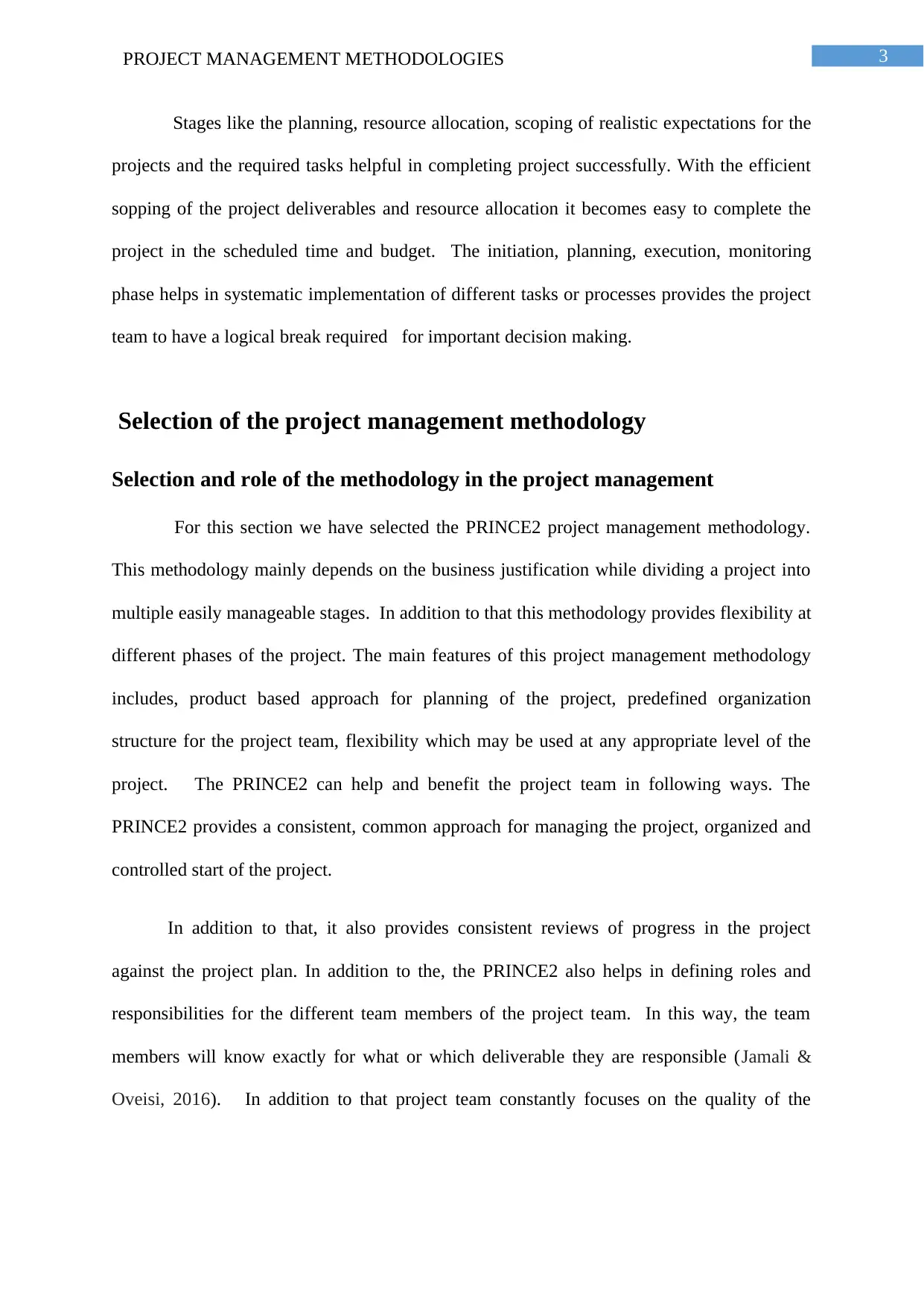
3PROJECT MANAGEMENT METHODOLOGIES
Stages like the planning, resource allocation, scoping of realistic expectations for the
projects and the required tasks helpful in completing project successfully. With the efficient
sopping of the project deliverables and resource allocation it becomes easy to complete the
project in the scheduled time and budget. The initiation, planning, execution, monitoring
phase helps in systematic implementation of different tasks or processes provides the project
team to have a logical break required for important decision making.
Selection of the project management methodology
Selection and role of the methodology in the project management
For this section we have selected the PRINCE2 project management methodology.
This methodology mainly depends on the business justification while dividing a project into
multiple easily manageable stages. In addition to that this methodology provides flexibility at
different phases of the project. The main features of this project management methodology
includes, product based approach for planning of the project, predefined organization
structure for the project team, flexibility which may be used at any appropriate level of the
project. The PRINCE2 can help and benefit the project team in following ways. The
PRINCE2 provides a consistent, common approach for managing the project, organized and
controlled start of the project.
In addition to that, it also provides consistent reviews of progress in the project
against the project plan. In addition to the, the PRINCE2 also helps in defining roles and
responsibilities for the different team members of the project team. In this way, the team
members will know exactly for what or which deliverable they are responsible (Jamali &
Oveisi, 2016). In addition to that project team constantly focuses on the quality of the
Stages like the planning, resource allocation, scoping of realistic expectations for the
projects and the required tasks helpful in completing project successfully. With the efficient
sopping of the project deliverables and resource allocation it becomes easy to complete the
project in the scheduled time and budget. The initiation, planning, execution, monitoring
phase helps in systematic implementation of different tasks or processes provides the project
team to have a logical break required for important decision making.
Selection of the project management methodology
Selection and role of the methodology in the project management
For this section we have selected the PRINCE2 project management methodology.
This methodology mainly depends on the business justification while dividing a project into
multiple easily manageable stages. In addition to that this methodology provides flexibility at
different phases of the project. The main features of this project management methodology
includes, product based approach for planning of the project, predefined organization
structure for the project team, flexibility which may be used at any appropriate level of the
project. The PRINCE2 can help and benefit the project team in following ways. The
PRINCE2 provides a consistent, common approach for managing the project, organized and
controlled start of the project.
In addition to that, it also provides consistent reviews of progress in the project
against the project plan. In addition to the, the PRINCE2 also helps in defining roles and
responsibilities for the different team members of the project team. In this way, the team
members will know exactly for what or which deliverable they are responsible (Jamali &
Oveisi, 2016). In addition to that project team constantly focuses on the quality of the
Paraphrase This Document
Need a fresh take? Get an instant paraphrase of this document with our AI Paraphraser

4PROJECT MANAGEMENT METHODOLOGIES
project. Deliverables after each stage is continuously checked against requirements of the
project.
project. Deliverables after each stage is continuously checked against requirements of the
project.
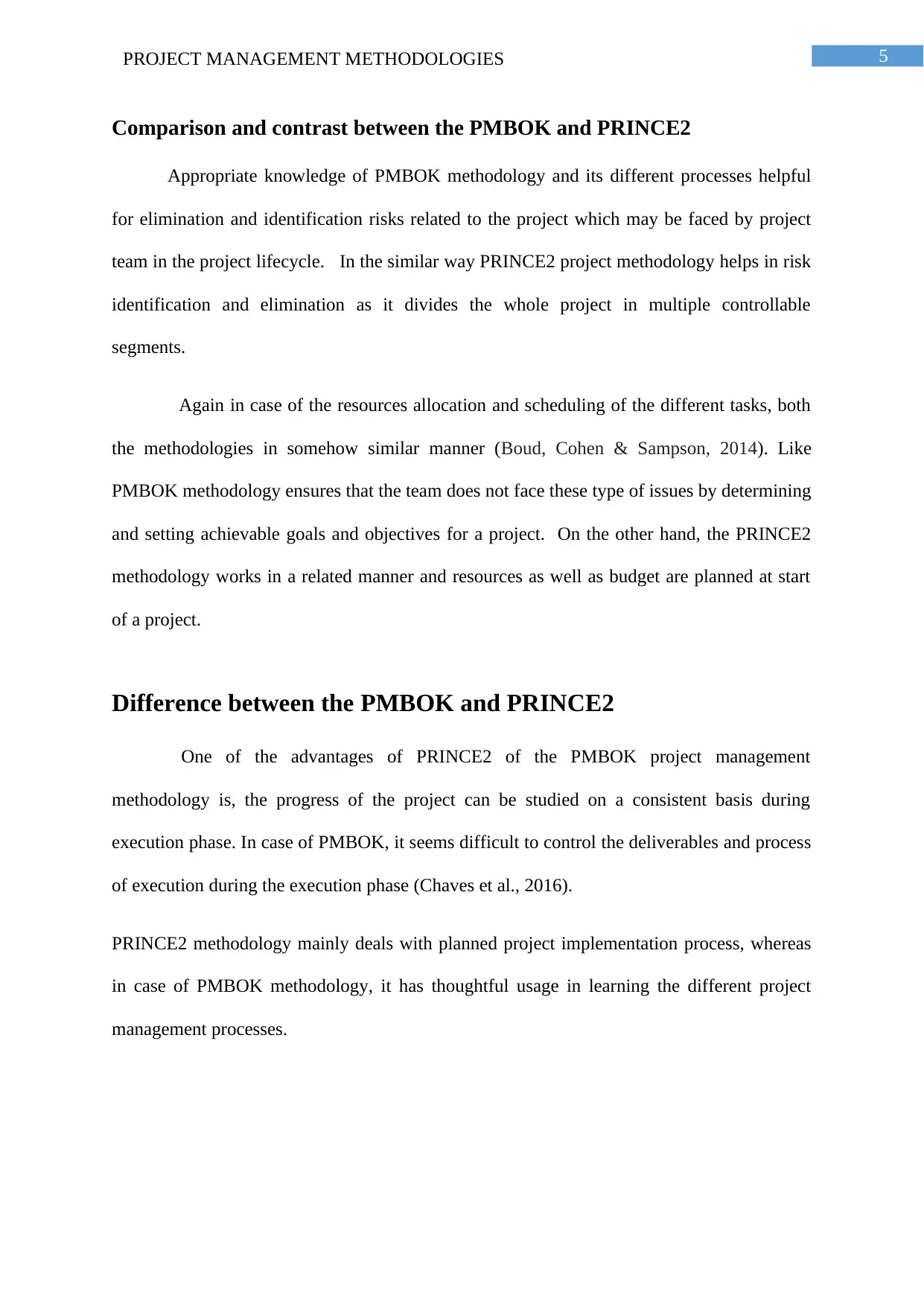
5PROJECT MANAGEMENT METHODOLOGIES
Comparison and contrast between the PMBOK and PRINCE2
Appropriate knowledge of PMBOK methodology and its different processes helpful
for elimination and identification risks related to the project which may be faced by project
team in the project lifecycle. In the similar way PRINCE2 project methodology helps in risk
identification and elimination as it divides the whole project in multiple controllable
segments.
Again in case of the resources allocation and scheduling of the different tasks, both
the methodologies in somehow similar manner (Boud, Cohen & Sampson, 2014). Like
PMBOK methodology ensures that the team does not face these type of issues by determining
and setting achievable goals and objectives for a project. On the other hand, the PRINCE2
methodology works in a related manner and resources as well as budget are planned at start
of a project.
Difference between the PMBOK and PRINCE2
One of the advantages of PRINCE2 of the PMBOK project management
methodology is, the progress of the project can be studied on a consistent basis during
execution phase. In case of PMBOK, it seems difficult to control the deliverables and process
of execution during the execution phase (Chaves et al., 2016).
PRINCE2 methodology mainly deals with planned project implementation process, whereas
in case of PMBOK methodology, it has thoughtful usage in learning the different project
management processes.
Comparison and contrast between the PMBOK and PRINCE2
Appropriate knowledge of PMBOK methodology and its different processes helpful
for elimination and identification risks related to the project which may be faced by project
team in the project lifecycle. In the similar way PRINCE2 project methodology helps in risk
identification and elimination as it divides the whole project in multiple controllable
segments.
Again in case of the resources allocation and scheduling of the different tasks, both
the methodologies in somehow similar manner (Boud, Cohen & Sampson, 2014). Like
PMBOK methodology ensures that the team does not face these type of issues by determining
and setting achievable goals and objectives for a project. On the other hand, the PRINCE2
methodology works in a related manner and resources as well as budget are planned at start
of a project.
Difference between the PMBOK and PRINCE2
One of the advantages of PRINCE2 of the PMBOK project management
methodology is, the progress of the project can be studied on a consistent basis during
execution phase. In case of PMBOK, it seems difficult to control the deliverables and process
of execution during the execution phase (Chaves et al., 2016).
PRINCE2 methodology mainly deals with planned project implementation process, whereas
in case of PMBOK methodology, it has thoughtful usage in learning the different project
management processes.
⊘ This is a preview!⊘
Do you want full access?
Subscribe today to unlock all pages.

Trusted by 1+ million students worldwide
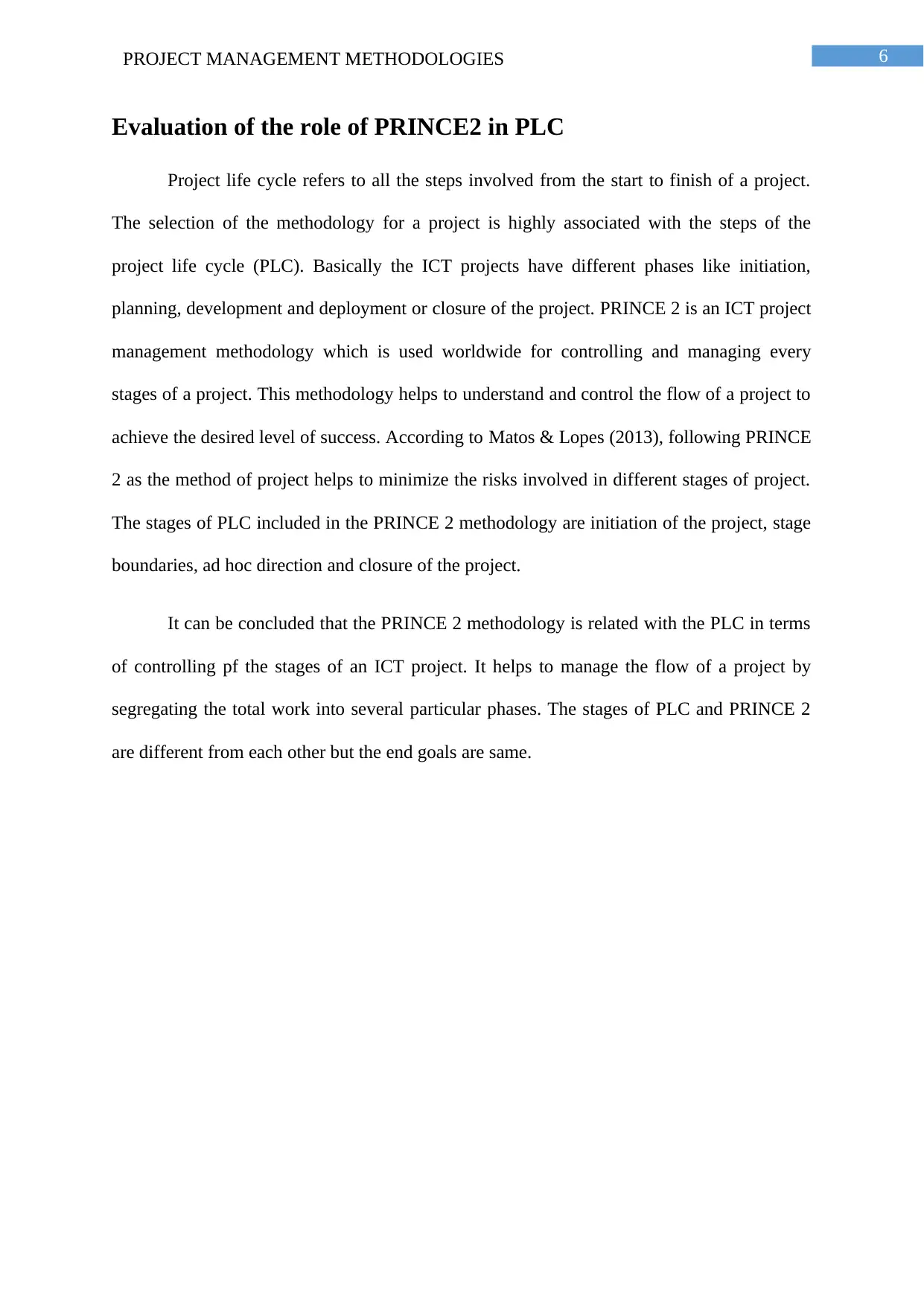
6PROJECT MANAGEMENT METHODOLOGIES
Evaluation of the role of PRINCE2 in PLC
Project life cycle refers to all the steps involved from the start to finish of a project.
The selection of the methodology for a project is highly associated with the steps of the
project life cycle (PLC). Basically the ICT projects have different phases like initiation,
planning, development and deployment or closure of the project. PRINCE 2 is an ICT project
management methodology which is used worldwide for controlling and managing every
stages of a project. This methodology helps to understand and control the flow of a project to
achieve the desired level of success. According to Matos & Lopes (2013), following PRINCE
2 as the method of project helps to minimize the risks involved in different stages of project.
The stages of PLC included in the PRINCE 2 methodology are initiation of the project, stage
boundaries, ad hoc direction and closure of the project.
It can be concluded that the PRINCE 2 methodology is related with the PLC in terms
of controlling pf the stages of an ICT project. It helps to manage the flow of a project by
segregating the total work into several particular phases. The stages of PLC and PRINCE 2
are different from each other but the end goals are same.
Evaluation of the role of PRINCE2 in PLC
Project life cycle refers to all the steps involved from the start to finish of a project.
The selection of the methodology for a project is highly associated with the steps of the
project life cycle (PLC). Basically the ICT projects have different phases like initiation,
planning, development and deployment or closure of the project. PRINCE 2 is an ICT project
management methodology which is used worldwide for controlling and managing every
stages of a project. This methodology helps to understand and control the flow of a project to
achieve the desired level of success. According to Matos & Lopes (2013), following PRINCE
2 as the method of project helps to minimize the risks involved in different stages of project.
The stages of PLC included in the PRINCE 2 methodology are initiation of the project, stage
boundaries, ad hoc direction and closure of the project.
It can be concluded that the PRINCE 2 methodology is related with the PLC in terms
of controlling pf the stages of an ICT project. It helps to manage the flow of a project by
segregating the total work into several particular phases. The stages of PLC and PRINCE 2
are different from each other but the end goals are same.
Paraphrase This Document
Need a fresh take? Get an instant paraphrase of this document with our AI Paraphraser
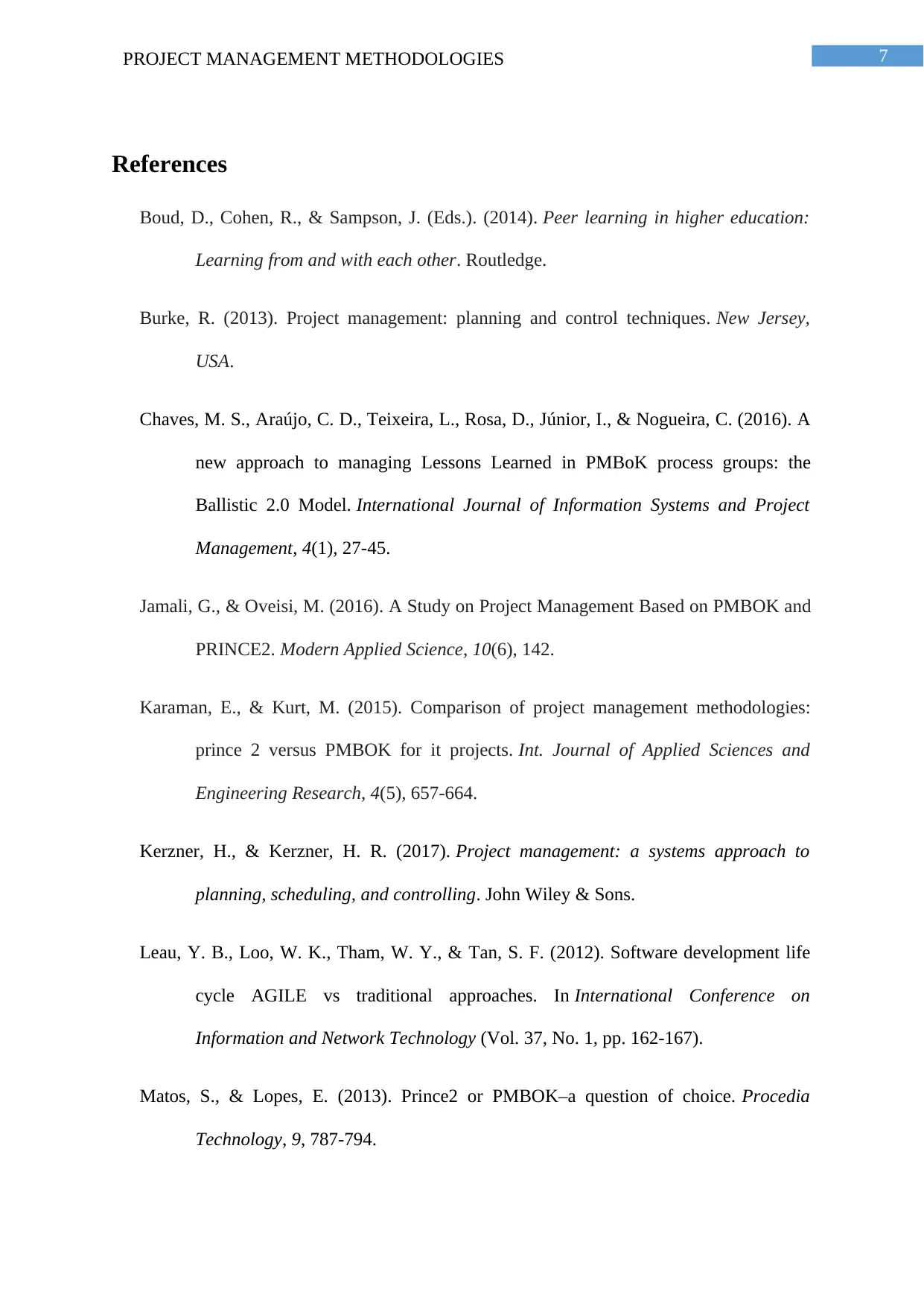
7PROJECT MANAGEMENT METHODOLOGIES
References
Boud, D., Cohen, R., & Sampson, J. (Eds.). (2014). Peer learning in higher education:
Learning from and with each other. Routledge.
Burke, R. (2013). Project management: planning and control techniques. New Jersey,
USA.
Chaves, M. S., Araújo, C. D., Teixeira, L., Rosa, D., Júnior, I., & Nogueira, C. (2016). A
new approach to managing Lessons Learned in PMBoK process groups: the
Ballistic 2.0 Model. International Journal of Information Systems and Project
Management, 4(1), 27-45.
Jamali, G., & Oveisi, M. (2016). A Study on Project Management Based on PMBOK and
PRINCE2. Modern Applied Science, 10(6), 142.
Karaman, E., & Kurt, M. (2015). Comparison of project management methodologies:
prince 2 versus PMBOK for it projects. Int. Journal of Applied Sciences and
Engineering Research, 4(5), 657-664.
Kerzner, H., & Kerzner, H. R. (2017). Project management: a systems approach to
planning, scheduling, and controlling. John Wiley & Sons.
Leau, Y. B., Loo, W. K., Tham, W. Y., & Tan, S. F. (2012). Software development life
cycle AGILE vs traditional approaches. In International Conference on
Information and Network Technology (Vol. 37, No. 1, pp. 162-167).
Matos, S., & Lopes, E. (2013). Prince2 or PMBOK–a question of choice. Procedia
Technology, 9, 787-794.
References
Boud, D., Cohen, R., & Sampson, J. (Eds.). (2014). Peer learning in higher education:
Learning from and with each other. Routledge.
Burke, R. (2013). Project management: planning and control techniques. New Jersey,
USA.
Chaves, M. S., Araújo, C. D., Teixeira, L., Rosa, D., Júnior, I., & Nogueira, C. (2016). A
new approach to managing Lessons Learned in PMBoK process groups: the
Ballistic 2.0 Model. International Journal of Information Systems and Project
Management, 4(1), 27-45.
Jamali, G., & Oveisi, M. (2016). A Study on Project Management Based on PMBOK and
PRINCE2. Modern Applied Science, 10(6), 142.
Karaman, E., & Kurt, M. (2015). Comparison of project management methodologies:
prince 2 versus PMBOK for it projects. Int. Journal of Applied Sciences and
Engineering Research, 4(5), 657-664.
Kerzner, H., & Kerzner, H. R. (2017). Project management: a systems approach to
planning, scheduling, and controlling. John Wiley & Sons.
Leau, Y. B., Loo, W. K., Tham, W. Y., & Tan, S. F. (2012). Software development life
cycle AGILE vs traditional approaches. In International Conference on
Information and Network Technology (Vol. 37, No. 1, pp. 162-167).
Matos, S., & Lopes, E. (2013). Prince2 or PMBOK–a question of choice. Procedia
Technology, 9, 787-794.

8PROJECT MANAGEMENT METHODOLOGIES
Svejvig, P., & Andersen, P. (2015). Rethinking project management: A structured
literature review with a critical look at the brave new world. International Journal
of Project Management, 33(2), 278-290.
Svejvig, P., & Andersen, P. (2015). Rethinking project management: A structured
literature review with a critical look at the brave new world. International Journal
of Project Management, 33(2), 278-290.
⊘ This is a preview!⊘
Do you want full access?
Subscribe today to unlock all pages.

Trusted by 1+ million students worldwide
1 out of 9
Related Documents
Your All-in-One AI-Powered Toolkit for Academic Success.
+13062052269
info@desklib.com
Available 24*7 on WhatsApp / Email
![[object Object]](/_next/static/media/star-bottom.7253800d.svg)
Unlock your academic potential
Copyright © 2020–2026 A2Z Services. All Rights Reserved. Developed and managed by ZUCOL.





